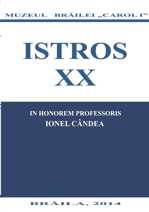Ius Valachicum în Polonia medievală. Partea I: tribunalele valahe numite strunga sau zbory
Ius Valachicum dans la Pologne médiévale. Partie I: les tribunaux valaques dits strungi ou zbory
Author(s): Grzegorz JaworSubject(s): History
Published by: Editura Istros - Muzeul Brailei
Keywords: kraina; congregatio; Red Ruthenia
Summary/Abstract: Every researcher of the histories of the Wallachian colonisation in the northern slopes of the Carpathian Mountains in its oldest medieval phase will encounter an obstacle in a form not only of the scarcity of sources, but also of an enormous dispersion of the preserved information. They can be encountered particularly in the preserved, handwritten judicial and taxation volumes from the areas of Lesser Poland (Małopolska) and Red Ruthenia, currently kept in the archives as well as the Polish and Ukrainian libraries. Such inquiry is remarkably time-consuming and the outcomes, gained as a result of the query, are usually very modest. For the Wallachian law encompassed highly peripheral territories, distant from the political and cultural centres of that time, which were places where the literary activity was universally used. The Wallachian settlers did not have this skill and the 14th- 15th centuries were a period when a document in the everyday practice was still not supplanting, particularly amongst the lower social strata, the oral testimonies of eyewitnesses or invoking the collective memory as the means for proving ones rights and claims. The abovementioned condition is, in the author’s opinion, a sufficient justification for the editorial board of „ Anuarul Institutului de Istorie A. D. Xenopol” to undertake the editing of the series of issues with the sources from the Polish and Ukrainian archives, published in the upcoming volumes of the journal and concerning various aspects of ius Valachicum at the territories of the medieval Kingdom of Poland. The sources, presented as the respective thematic groups, are the results of an archival and library inquiry, which has been conducted with some breaks since 1992. At this point the author wishes to express hope that they will, at least at a minimal scale, contribute to renewing the interests, particularly amongst the Romanian historians, in the Wallachian colonisation of the regions which were distant from the native Moldova, Wallachia and Transylvania. The judicial assemblies, having already been the interest of our attention, had been previously discussed in a few publications of my authorship, available in both Polish and Romanian languages. At this point I will limit myself to recalling just a few results. The country villages, located on the basis of the Wallachian law, created specific beyond-countryside communities referred to as regions (krainy). An official called krajnik owned numerous qualifications and was placed at the forefront of the community. The village community constituting the kraina would gather twice a year, during springtime and autumn, for a meeting which purpose was to collect tribute, to hold courts which would arbitrate particularly the more serious criminal cases, but also the disputes between the respective village chieftains called kniazie. These judicial rallies were referred to as strungi or zbory. The word strunga (stronga, strąga) in both the Polish highlande
Journal: ISTROS
- Issue Year: 20/2014
- Issue No: 1
- Page Range: 493-527
- Page Count: 35
- Content File-PDF

